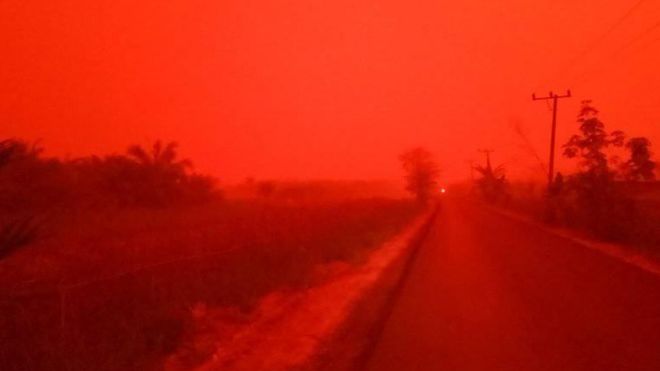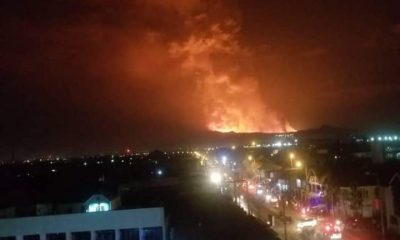International
KALANGITAN SA INDONESIA MISTULANG NAGDURUGO DULOT UMANO NG FOREST FIRES


Naging pula at mistulang nagdurugo ang kalangitan sa isang lalagiwan ng Indonesia nitong katapusan ng linggo dahil sa laganap na malawakang sunog sa kagubatan na nangyari sa malaking bahagi ng bansa.
Ayon naman sa isang dalubhasa ng meteorolohiya, ang hindi pangkaraniwang kalangitan ay sanhi ng isang phenomenon na tinatawag na Rayleigh scattering.
Kwento ng isang residente na si Eka Wulandari, ng Mekar Sari village sa Jambi province, siya ang kumuha ng litrato ng mapulang kalangitan nitong Sabado.
The haze had “hurt her eyes and throat.”
“But it’s true. [It’s a] real photo and video that I took with my phone,” wika ni Wulandari.
Paliwanag naman ni Professor Koh Tieh Yong, ng Singapore University of Social Sciences, ang nasabing phenomenon na Rayleigh scattering ay may kinalaman sa ilang mga uri ng mga particle na naroroon sa panahon ng haze.
“In the smoke haze, the most abundant particles are around 1 micrometre in size, but these particles do not change the colour of the light we see,” wika ng propesor.
“There are also smaller particles, around 0.05 micrometres or less, that don’t make up a lot of the haze but are still somewhat more abundant during a haze period [than a normal non-haze period]… but this is enough to give an extra tendency to scatter red light more in the forward and backward directions than blue light – and that is why would you see more red than blue.”
Sinabi niya na ang mga larawan ay nakuha bandang tanghali kaya’t maaaring naging sanhi ito kaya namula ang kalangitan.
“If the sun is overhead and you look up, [you will be looking] in the line of the sun, so it would appear that more of the sky is red,” paliwanag ni Koh Tieh Yong.
Source: BBC NEWS












